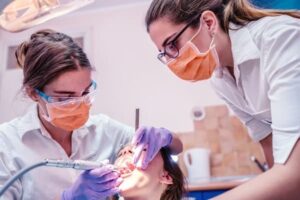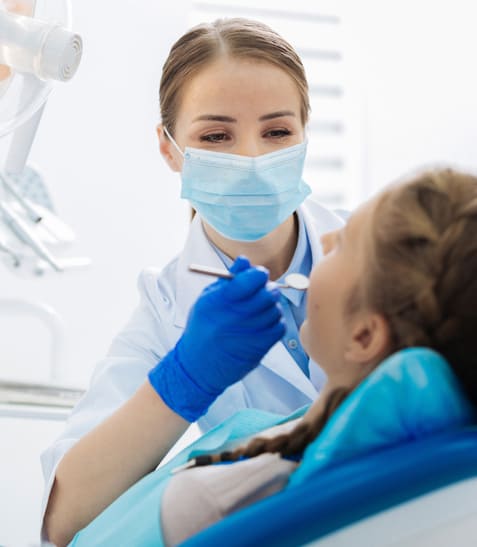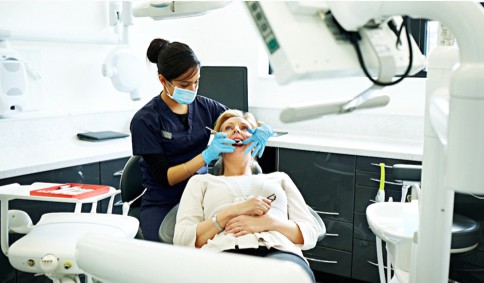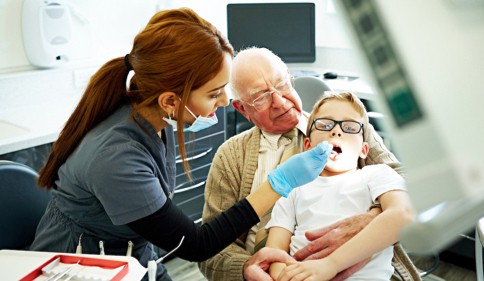 Dental Assistant Training Near Me
Dental Assistant Training Near Me
SJVC’s Dental Assisting certificate program is available at the following campuses:
Are you interested in dentistry and passionate about helping people? Then a dental assistant career could be for you. Dental assistants work in dental offices under the supervision of dentists. They have excellent interpersonal, organizational and listening skills.
Dental assistants perform a variety of patient care and administrative duties. They take x-rays, schedule patient appointments and assist dentists during dental procedures. They’re different, however from dental hygienists. The biggest difference between the two is that dental hygienists have less supervision and work more frequently with patients.
For those curious about dentistry and eager to gain practical experience, becoming a dental assistant is a great place to start. This guide covers the following topics as they relate to dental assistant careers:
The job outlook for dental assistants is bright.1
Employment of dental assistants is related to the need for dental care. The BLS notes two possible causes increasing the demand for dental care and preventative services. The first is continued research tying oral and general health together. The second has to do with the baby boomer population; as they age and keep their original teeth, the need for dental care increases. As the need for dental care and practices grows, dentists will need to hire more dental assistants to work efficiently.
Becoming a dental assistant can also lead to additional career opportunities. If you want to further your dental career and continue working with patients, you can work toward a career as a dental hygienist or dentist.
Dental assistants are critical members of dental care teams and enjoy many career benefits. In fact, the American Dental Association (ADA) notes the following advantages of dental assistant careers:2
Dental assistants provide patient care and support dentists through a variety of tasks. Their duties vary by job but typically include:3
During a procedure, a dental assistant helps dentists by passing equipment like suction hoses, syringes, probes, matrix bands, etc. While dental assistants are highly involved in the preparation and execution of dental procedures, they cannot actually perform dental procedures; that is the role of the dentist.
Dental assistants perform several roles related to patient support, administrative, and clinical work. Some of which involves performing office management duties, assisting the dentist during treatment procedures, and sterilizing equipment.
Dental hygienists focus on the cleanliness of a patient’s orthodontic health. Their responsibilities might include cleaning or polishing a patients’ teeth, performing dental health examinations, and educating patients on at-home dental safety.
 What is a Day in the Life of a Dental Assistant Like?
What is a Day in the Life of a Dental Assistant Like?A day in the life of a dental assistant includes working with dentists, dental hygienists and patients in a dentist’s office. Dental assistants work under the supervision of dentists, and many work full-time. Some also work evenings or weekends, depending on the dental office they work for.
One of the most important roles of dental assistants is providing chair-side support to patients and dentists. This is often done through preparation tasks such as ensuring instruments and equipment are sanitized. Dental assistants can prep materials for impressions or temporary crowns as well.
They also prepare patients for dental care and procedures by documenting their medical history, blood pressure or pulse. Additionally, dental assistants explain dental hygiene to patients and play a critical role in making patients feel at ease before a procedure.
 Skills for Dental Assistants
Skills for Dental AssistantsDental assistants need a combination of technical and soft skills. Many of the technical skills can be learned through classroom knowledge and developed through hands-on training. Dental assistants typically need technical skills related to:
Important qualities of dental assistants, as noted by the BLS, include:4
Becoming a dental assistant in California requires formal education and/or training and licensure. To become a registered dental assistant (RDA) licensed by the Dental Board of California, the following steps must be taken:5
While aspiring dental assistants can learn on-the-job, a certificate program is an advantageous path for those who want to become a licensed dental assistant. A distinct advantage of certificate programs is that they typically incorporate the Board-required courses related to coronal polishing, radiation safety, infection control and basic life support.
If you choose to become an unlicensed dental assistant, you still must complete the following:
 Do You Need to be Certified to be a Dental Assistant?
Do You Need to be Certified to be a Dental Assistant?You don’t need to be certified to be a dental assistant. However, dental assistant certification can help you gain additional technical skills and advance your career. Most dental assistants who want to gain certification take the Certified Dental Assistant (CDA) examination from the nationally-recognized Dental Assisting National Board (DANB).
According to the DANB, the CDA exam consists of three components: General Chairside Assisting (GC), Radiation Health and Safety (RHS) and Infection Control (ICE).6 DANB also offers advanced certifications, such as the Certified Preventive Functions Dental Assistant (CPFDA) and Certified Restorative Functions Dental Assistant (CRFDA) certifications.
Choosing a dental assisting program is a big decision. Dental assistant training programs provide a combination of classroom knowledge and hands-on training to prepare you for a dental assistant career. Consider the following when choosing the right dental assisting program for you:
Becoming a dental assistant can take anywhere from nine months to two years, depending on the dental assisting career path and program you pursue. The Dental Assisting Certificate of Completion program at SJVC can be completed in as few as 11 months.
Dental Assisting program classes are generally tailored to meet national certification and state-specific licensure requirements. You can expect your dental assist courses to cover topics such as:
 Dental Assisting Jobs in California
Dental Assisting Jobs in CaliforniaMany dentists hire two or more dental assistants for their practices, according to the ADA.7 The ADA also notes that dental assistants can look for job opportunities in various settings, such as: solo and group practices, speciality practices (such as orthodontics or periodontics), public health dentistry, hospital dental clinics, dental school clinics, insurance companies, technical schools, and dental sales.
There are many dental assisting jobs in California. According to the BLS, California has the highest employment level of dental assistants.8 Additionally, per the BLS, it has the third “highest concentration of jobs and location quotients” of all states.
Some major dental companies in California, according to IBISWorld’s 2018 market report, include:9
Are you interested in dental assistant careers? SJVC’s Dental Assisting program offers training in patient care, office and laboratory duties. Through our program, you’ll earn certifications in Dental Radiation Safety, CPR, Infection Control and Dental Law and Ethics. With the completion of coronal polish and pit and fissure sealants, students are eligible to take the Dental Board of California Examination for state licensure. SJVC prepares students to take appropriate certification and licensure exams related to their individual majors. The College does not guarantee students will successfully pass these exams or be certified or licensed as a result of completing the program. You can complete SJVC’s Dental Assisting program in as few as 11 months.
SJVC is committed to the personal, academic and professional success of its students. Our faculty bring years of knowledge and experience to the classroom. They’re passionate about helping you succeed. Whether you’re preparing for your first job out of college or a career switch, there’s a place for you here.
SJVC’s students range from those just out of high school to people looking to change careers later in life. We take pride in making sure staff knows your story so you can get the individual help and attention you need to succeed.
 Dental Assistant Training Near Me
Dental Assistant Training Near MeSJVC’s Dental Assisting certificate program is available at the following campuses:
You can earn dental assistant certification in as little as 11 months.
Sources:
All fields using an asterik (*) are required.
Our RN to BSN program is a Bachelors degree completion option for Registered Nurses.